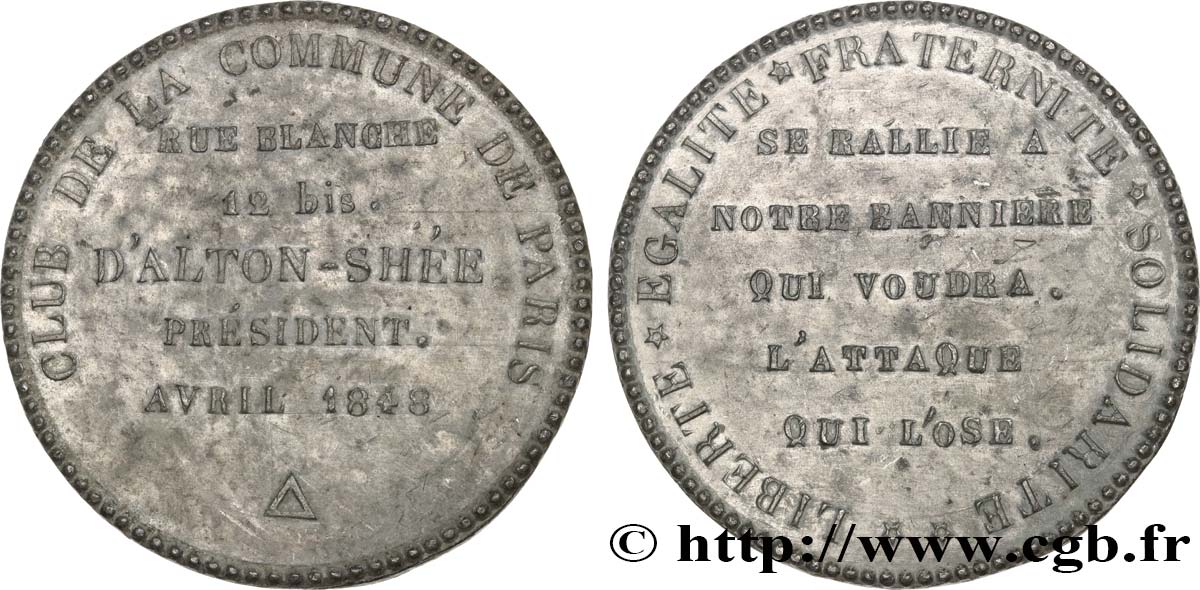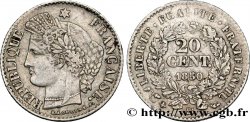E-auction 344-259306 - fme_367780 - II REPUBLIC Club de la Commune de Paris
得先注册又得到批准才可以报价。为了报价注册. 客户应该得到公司允许,那种过程需要 48 个小时。别等出售结束那一天才登记。您报价的话等于您赞成买那物品,而且按« 保价 » 证明您接受 cgb.fr 因特网拍卖使用法.
报价时只可以出全数值欧元总额。物品描述也说明销售结束时间,结束后出价都不会生效。 报价命令转达有时变动,等到最后秒钟增加否决的可能会。想多了解的话请注意 因特网拍卖常问
购货人不付费
购货人不付费
| 估算 : | 220 € |
| 价格 : | 45 € |
| 最高出价 : | 45 € |
| 拍卖结束日期 : | 18 November 2019 18:27:30 |
| 竞拍人 : | 9 竞拍人 |
种类 Club de la Commune de Paris
日期: 1848
铸币厂名称/城市 75 - Paris
材质 tin
直径 60 mm
模子方针 3 h.
重量 38 g.
侧面 lisse
关于品相的说明
Médaille en très bon état de conservation. Patine grise hétérogène avec des traces de manipulation et petites rayures
正面
正面的文字 CLUB DE LA COMMUNE DE PARIS / RUE BLANCHE / 12 BIS / D’ALTON-SHÉE / PRÉSIDENT. / AVRIL 1848.
正面的说明书 Légende en 5 lignes horizontales et légende autour.
背面
背面的文字 LIBERTÉ * ÉGALITÉ * FRATERNITÉ * SOLIDARITÉ / SE RALLIE A / NOTRE BANNIÈRE / QUI VOUDRA. / L’ATTAQUE / QUI L’OSE..
背面的说明书 Légende en 5 lignes horizontales et légende autour.
评论
Jusqu'en 1847, le comte d'Alton Shée resta dans les rangs du parti dynastique, et appuya en toutes circonstances la politique de Guizot. Mais tout à coup, au début de l'agitation réformiste qui précéda la révolution de 1848, il se jeta dans l'opposition et n'hésita pas à manifester, à la tribune même de la Chambre haute, des opinions nettement révolutionnaires. C'est ainsi qu'il fit, le 19 mai 1847, un grand discours contre le projet de loi relatif au chapitre royal de Saint-Denis. Il dit à ce propos :
« Je ne veux tromper personne, je ne tiens à capter l'approbation de personne, mais je crois devoir et aux autres et à moi-même d'indiquer franchement, librement, et mon point de départ et le but que je poursuis : ainsi ne voyez en moi ni l'un de ces catholiques fervents, réclament pour leur religion les conséquences de notre révolution de Juillet ; ne voyez pas en moi l'un de ces chrétiens politiques qui du haut de leur intelligence, professent la religion à cause de son utilité, je ne suis ni catholique, ni chrétien ! »
Dans maintes discussions sur les affaires étrangères, il attaqua avec véhémence le duc de Modène, qu'il appela un « Néron en raccourci », la reine de Portugal, une « princesse parjure », et M. de Metternich, un « vieillard cruel et corrompu ».
À dater de cette époque, le comte d'Alton-Shée, entièrement converti aux idées démocratiques, prit part à toutes les manifestations du parti avancé. Il s'arma comme garde national en faveur du mouvement, en février 1848, fut nommé colonel de la 2e légion de la banlieue, défendit dans les clubs, la personne et la politique de Ledru-Rollin, combattit la dictature4 de Cavaignac et la présidence de Louis-Napoléon Bonaparte, et, à la suite d'une vive protestation signée de lui contre l'interdiction des clubs votée par la Chambre le 11 mars 1849, fut arrêté et emprisonné.
Membre influent du comité démocratique socialiste de la Seine, il fut lui-même sur la liste des candidats de cette nuance à l'Assemblée législative, mais il échoua de quelques voix..
Until 1847, Count d'Alton Shée remained in the ranks of the dynastic party, and supported Guizot's policy in all circumstances.. But suddenly, at the beginning of the reformist agitation which preceded the revolution of 1848, he threw himself into the opposition and did not hesitate to express, from the very tribune of the Upper House, clearly revolutionary opinions.. This is how he made, on May 19, 1847, a major speech against the bill relating to the royal chapter of Saint-Denis. He said about this: \\\"I do not want to deceive anyone, I do not want to gain anyone's approval, but I believe it is my duty both to others and to myself to indicate frankly, freely, both my starting point and the goal I am pursuing: so do not see in me one of those fervent Catholics, who demand for their religion the consequences of our July revolution; do not see in me one of those political Christians who, from the height of their intelligence, profess religion because of its usefulness, I am neither Catholic nor Christian!\\\" In many discussions on foreign affairs, he vehemently attacked the Duke of Modena, whom he called a \\\"Nero in short\\\", the Queen of Portugal, a \\\"perjured princess\\\", and M. of Metternich, a “cruel and corrupt old man”.
From this time on, the Earl of Alton-Shée, entirely converted to democratic ideas, took part in all the manifestations of the advanced party. He armed himself as a national guard in support of the movement in February 1848, was named colonel of the 2nd legion of the suburbs, defended in the clubs the person and the policy of Ledru-Rollin, fought the dictatorship4 of Cavaignac and the presidency of Louis-Napoléon Bonaparte, and, following a strong protest signed by him against the ban on clubs voted by the Chamber on March 11, 1849, was arrested and imprisoned.
An influential member of the Seine Democratic Socialist Committee, he himself was on the list of candidates of this shade for the Legislative Assembly, but he failed by a few votes..
« Je ne veux tromper personne, je ne tiens à capter l'approbation de personne, mais je crois devoir et aux autres et à moi-même d'indiquer franchement, librement, et mon point de départ et le but que je poursuis : ainsi ne voyez en moi ni l'un de ces catholiques fervents, réclament pour leur religion les conséquences de notre révolution de Juillet ; ne voyez pas en moi l'un de ces chrétiens politiques qui du haut de leur intelligence, professent la religion à cause de son utilité, je ne suis ni catholique, ni chrétien ! »
Dans maintes discussions sur les affaires étrangères, il attaqua avec véhémence le duc de Modène, qu'il appela un « Néron en raccourci », la reine de Portugal, une « princesse parjure », et M. de Metternich, un « vieillard cruel et corrompu ».
À dater de cette époque, le comte d'Alton-Shée, entièrement converti aux idées démocratiques, prit part à toutes les manifestations du parti avancé. Il s'arma comme garde national en faveur du mouvement, en février 1848, fut nommé colonel de la 2e légion de la banlieue, défendit dans les clubs, la personne et la politique de Ledru-Rollin, combattit la dictature4 de Cavaignac et la présidence de Louis-Napoléon Bonaparte, et, à la suite d'une vive protestation signée de lui contre l'interdiction des clubs votée par la Chambre le 11 mars 1849, fut arrêté et emprisonné.
Membre influent du comité démocratique socialiste de la Seine, il fut lui-même sur la liste des candidats de cette nuance à l'Assemblée législative, mais il échoua de quelques voix..
Until 1847, Count d'Alton Shée remained in the ranks of the dynastic party, and supported Guizot's policy in all circumstances.. But suddenly, at the beginning of the reformist agitation which preceded the revolution of 1848, he threw himself into the opposition and did not hesitate to express, from the very tribune of the Upper House, clearly revolutionary opinions.. This is how he made, on May 19, 1847, a major speech against the bill relating to the royal chapter of Saint-Denis. He said about this: \\\"I do not want to deceive anyone, I do not want to gain anyone's approval, but I believe it is my duty both to others and to myself to indicate frankly, freely, both my starting point and the goal I am pursuing: so do not see in me one of those fervent Catholics, who demand for their religion the consequences of our July revolution; do not see in me one of those political Christians who, from the height of their intelligence, profess religion because of its usefulness, I am neither Catholic nor Christian!\\\" In many discussions on foreign affairs, he vehemently attacked the Duke of Modena, whom he called a \\\"Nero in short\\\", the Queen of Portugal, a \\\"perjured princess\\\", and M. of Metternich, a “cruel and corrupt old man”.
From this time on, the Earl of Alton-Shée, entirely converted to democratic ideas, took part in all the manifestations of the advanced party. He armed himself as a national guard in support of the movement in February 1848, was named colonel of the 2nd legion of the suburbs, defended in the clubs the person and the policy of Ledru-Rollin, fought the dictatorship4 of Cavaignac and the presidency of Louis-Napoléon Bonaparte, and, following a strong protest signed by him against the ban on clubs voted by the Chamber on March 11, 1849, was arrested and imprisoned.
An influential member of the Seine Democratic Socialist Committee, he himself was on the list of candidates of this shade for the Legislative Assembly, but he failed by a few votes..








 对产品描述纠错
对产品描述纠错 打印
打印 分享我的选择
分享我的选择 提问
提问 Consign / sell
Consign / sell
 产品介绍
产品介绍











